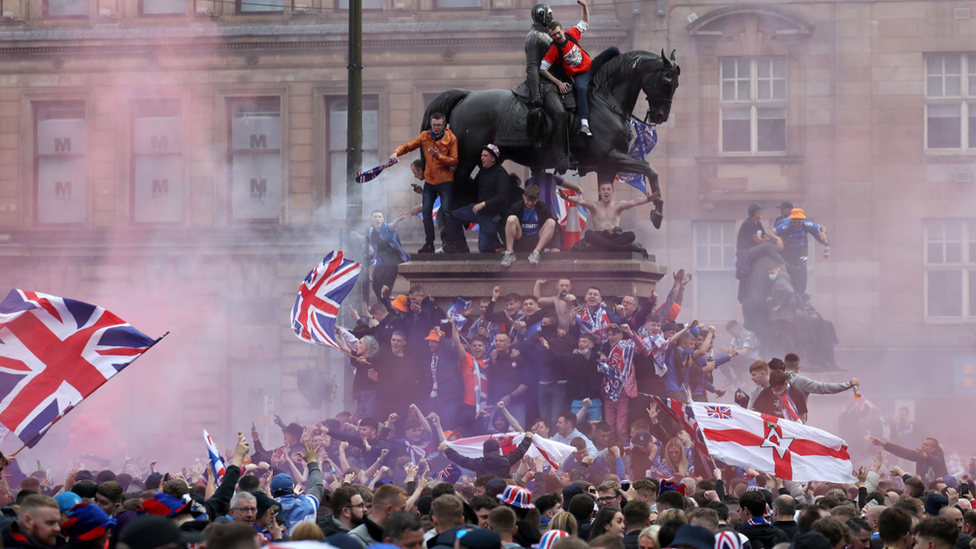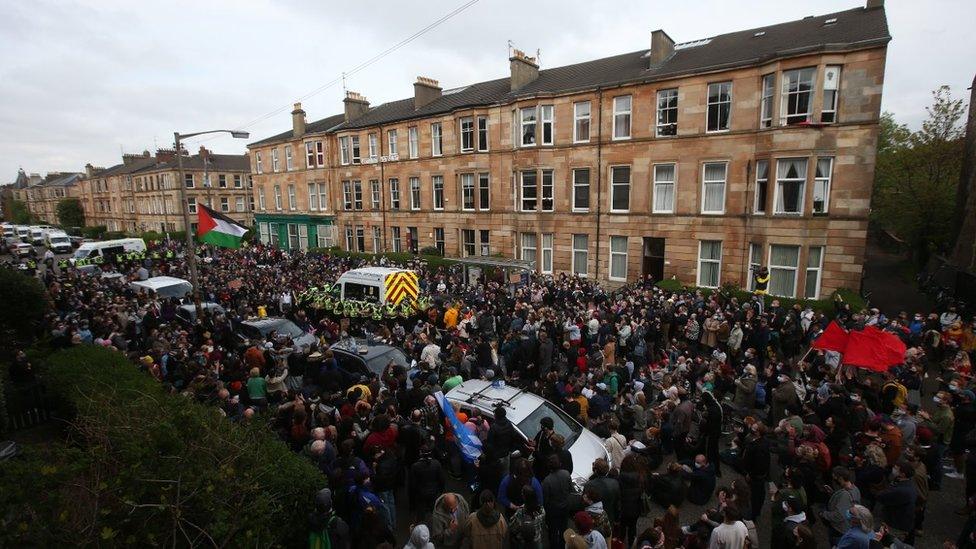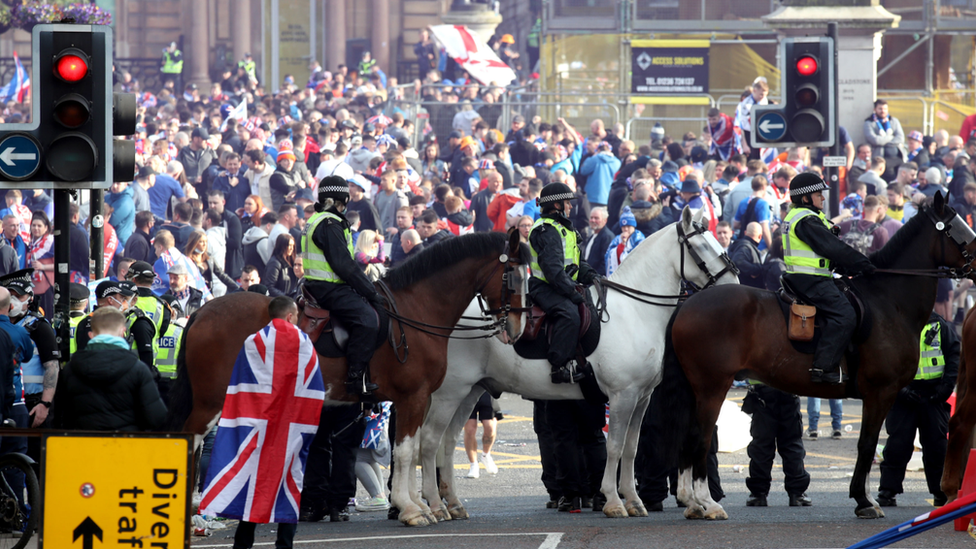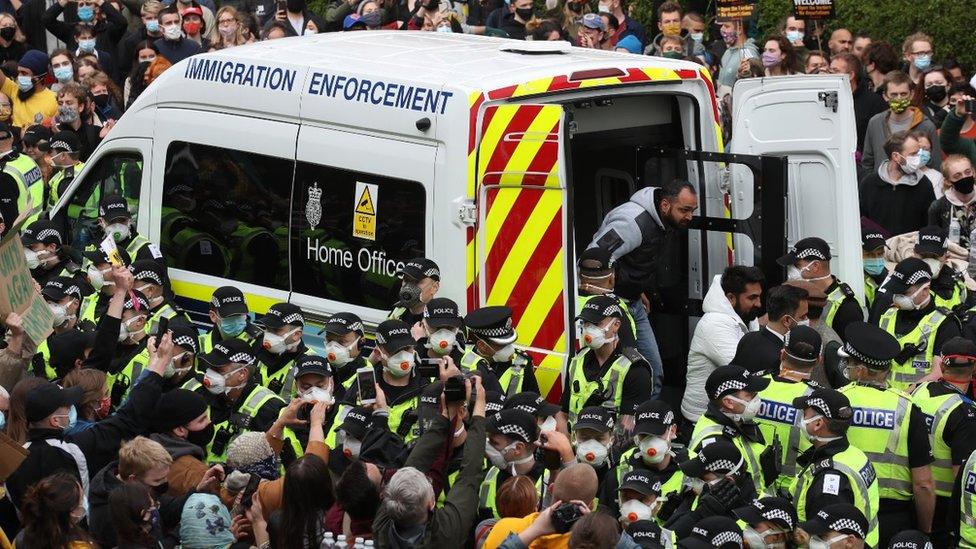Police Scotland crowd control critics 'should know better'
- Published

Thousands of fans marched to George Square after Rangers were presented with the Scottish Premiership trophy on 15 May
A leading QC has called on politicians not to indulge in "whataboutery" in relation to the policing of mass gatherings during the pandemic.
John Scott prepared a report for the Scottish Police Authority on recent major events in Glasgow.
It focuses on the immigration protests in Kenmure Street and Rangers fans' title celebrations in George Square.
Chief Constable Iain Livingstone told the SPA the response to both was "proportionate and professional".
Hundreds of people gathered in Kenmure Street in the Pollokshields area of the city on 13 May to prevent the removal of two men by Home Office immigration officials.
'Disgraceful'
Two days later an estimated 15,000 Rangers supporters gathered in George Square to celebrate the club's first Scottish Premiership title in a decade.
Five police officers were injured and 28 were arrested amid scenes that were branded "disgraceful".
The crowds were eventually dispersed due to "rising disorder" and a dedicated inquiry team is now working to identify those involved.
Mr Scott was commissioned by the chief constable to review Police Scotland's use of the emergency powers.
His letter to the SPA, external, which met on Wednesday, said a range of views had been expressed on the apparent tolerance of the two gatherings despite them being contrary to Covid regulations.
It continues: "Some have suggested that neither event should have been allowed to develop into a large gathering.
"That is to ignore the right of peaceful assembly which, especially outdoors, should be given considerable weight, even in a pandemic."

Hundreds of people gathered in Kenmure Street in Glasgow on 13 May to prevent the removal of two men by immigration officials
Mr Scott highlighted claims that Rangers supporters were treated in a different manner than the Kenmure Street protestors.
His letter continues: "They are right, but really only at a point when public order considerations required action to prevent serious injury and damage to property. In fact, serious injury was suffered by police officers and others on 15 May.
"That alone should be sufficient to distinguish the two events and explain the policing approach, despite attempts by some to indulge in 'whataboutery', including some politicians, who should know better."
Earlier, he told BBC Radio's Good Morning Scotland programme: "Without naming names and politicians - they know exactly who they are - people in elected positions who comment on even single incidents on the basis of limited, or no, information sometimes put pressure on the police and may end up compromising operational independence.
"'Whataboutery' is looking at different examples and failing to understand, or acknowledge, the different context and claiming something has been done differently for ulterior purposes, which is not what has happened here."
Mr Scott's report concluded suggestions of bias on the part of the force played "no part in operational decisions".
He concluded: "The best protection - both for the integrity of the rule of law, and for the protection of rights of every citizen in Scotland - lies in the operational independence of policing, and its ability to rise above media and political noise and make decisions based on the law and public safety.
"That operational independence may be an important point of constancy in a period of increasingly unsettled constitutional politics."
'No undue political influence'
The chief constable also told the SPA that operational independence was a key principle in a democratic society and vowed his officers would not discriminate between gatherings.
He said: "Policing is not, cannot be, directed in operational matters by government ministers, by politicians or indeed a police authority."
The chief also confirmed there was "no undue political influence" on him in relation to the release of the two men who were being detained by immigration officials in Pollokshields.
SPA chair Martyn Evans said Mr Livingstone was right to remind everyone that his force are "champions of all our human rights", regardless of "popularity or populism".
He also told the meeting the view of the Independent Advisory Group, that there was no evidence of bias in operational decisions, was "informed by and consistent with human rights principles".
Mr Evans added: "That should be repeated loud and clear by all of us who have an interest in a fair and open society."
Related topics
- Published16 May 2021

- Published13 May 2021
